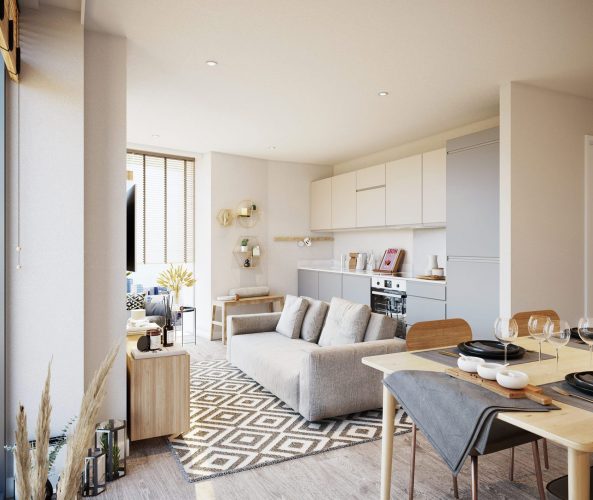
A complete guide to property investment
- House prices in the UK have risen by more than £50,000 on average since the start of 2020, according to Halifax (February 2023), but some high-growth areas have seen even greater gains and continue to do so.
- Average rental prices are predicted to increase by 18.2% between 2023 and 2027 (Statista).
- It is estimated that the number of renters in the UK could surpass the number of homeowners by 2039, meaning demand for rental properties will continue to climb.
This complete guide to property investment will explore the intricacies of the industry
At BuyAssociation, our team of highly experienced and qualified property investment consultants have a wealth of knowledge that enables us to advise and guide our community of investors to achieve their investment goals.
Whether you’re a first-time buyer, a portfolio landlord or an international investor, or just someone who wants to learn more about what’s involved in property investment, BuyAssociation can help. We understand that every investor has different priorities and faces unique challenges, and we offer a range of services and options to suit your needs.
If you are looking to start your own investment journey, our guide below is a great place to begin. If you have any questions, don’t hesitate to get in touch.


What is an investment property?
An investment property is a property that you purchase that is not your main residence, with the intention of making a return on it in the future. The property can either be bought as an established building, or as a property that is yet to be constructed (off-plan).
A return on investment can come from:
- Rental income from tenants
- Capital appreciation once the property is sold
- A combination of the two
BuyAssociation is a premier property investment company that has brought to market some of the most unique and appealing investment properties in the UK. With our market-leading results and expert support, our team of consultants helps to ensure that clients meet their financial goals with each investment.


Property investment UK: Why invest?
Having witnessed the value of your own home increase over the years, you may be interested in the possibility of gaining a passive income or capital appreciation from an investment property. If you’re a current homeowner, you will already be familiar with the processes involved with property purchase – but even if you’re a first-time buyer, you can buy a property investment.
The UK property market has continually proven to be one of the most lucrative and stable investment markets in the UK, remaining resilient through economic turbulence over the long-term. For those who rent out their investment property, it can be an excellent source of monthly income, while owning the property for an extended period of time, or buying off-plan, can ensure healthy capital appreciation in the UK’s strong housing market.
As the population continues to grow, so does the need for housing, keeping prices buoyant and rental demand strong. Almost 20% of the population now lives in privately rented accommodation, and this figure is on the rise, making it an opportune time to invest in rental property.
When you’re first starting out, it can be helpful to get advice on the specifics of investment and how to start building a solid property portfolio from expert consultants, financial advisers and lenders. All investments should be made with diligence, care and professional guidance.



The benefits of property investment
Passive income – This comes from both the increase in the value of the property over time, and any monthly rental income that you receive, meaning that even where house prices are not accelerating at the same rate, you will continue to make returns until the market improves over the long term.
Popular retirement plan – Many investors choose to sell their properties as they reach retirement age, ensuring that they benefit from capital appreciation at the right time.
Long-term stability – Investing in the property market is a much more stable approach than investing in shares – this is because the stock market is often perceived as unreliable due to stock prices regularly fluctuating. There are risks, of course, but you won’t see the same drastic price variations.
Control – As a buy-to-let landlord, you have direct control over maximising your property’s value. There is a high level of flexibility that comes with property investment, allowing you to provide additional amenities, carry out refurbishment and make improvements that will inevitably improve its value. This, in turn, can boost your returns through higher rents and house price growth.
Get in touch
Formulating your investment strategy: What is there to consider?
Choosing to invest in property is a decision that should not be taken lightly. There are many factors to consider before taking the first step, and we will take you through some of them here to help you decide on the best strategy for you.
Our property investment specialists are always happy to discuss your goals with you, and assist you in putting together a comprehensive plan. You can also refer to our online resources for help with investment basics.


Choose your approach
There are a few different strategies you might opt for when it comes to investing in a property, whether you’re an individual buyer or a group of investors.
One popular approach is to buy a new-build, off-plan property, where you acquire your property either before or during the construction process. This approach can lead to much stronger capital appreciation, as the property gains value during the course of the build and any surrounding regeneration. New-builds are also popular among tenants, and can bring in much higher rents than older homes – particularly as they tend to be significantly more energy-efficient.
Alternatively, some investors choose to purchase an old home with the intention of refurbishing and reselling it for a property. This method can be very lucrative if you choose the right property, and particularly so if you are able to do some of the work yourself, as refurbishment costs are particularly high at the moment.
We recommend doing some research and starting your investment journey with one of the above tactics in mind, in order to be clear on how you plan to make a profit – whether it be for a short-term or a long-term gain.


Assess what you can afford
Financial viability is a factor that cannot be ignored. If you plan to make your purchase using a buy-to-let mortgage, for example, you will need to work out what level of deposit you will need to secure the loan, as lenders tend to offer lower loan-to-values on these mortgage products. The larger your deposit, the better mortgage deal you will secure. Therefore, make sure you do your calculations to check that you can afford a substantial down payment, or enlist the help of a qualified adviser.
You must also have enough money set aside to pay for the other aspects of the property purchase, including stamp duty, solicitors’ fees, mortgage fees and insurance.
There are a wide variety of options available to you in terms of funding your investment. Whether you choose to partner up, take out a buy-to-let mortgage or consider crowdfunding, you should be diligent in your approach and plan extensively.


Talk to a property investment consultant to make an informed decision
The ability to build your own property portfolio is within your reach without any expert assistance; however, a trustworthy property investment consultant can contribute significantly to your long-term return on investment. They can help you stay abreast of any property forecasts, emerging markets and development projects that accommodate your budgets and goals.
By working with a professional, you’ll cover all possible bases to ensure you are on the right track to generating revenue. They’ll help you identify the best areas to invest and the ways in which you can do so.
What does a property investment consultant do and what are the benefits of this service?
Investing in a new property is always an exciting venture. However, while most purchases go smoothly, it can sometimes take a wrong turn or unexpected issues can arise. This is why it can be helpful to have someone guiding us through the process who has all the knowledge and information required to get things back on track. Who better to help you navigate this journey than a property investment consultant?
Here are just a few ways a consultant can help:
-
Help you secure the best price
It’s rare to find the best bargains among high street estate agents. Because we specialise in off-plan developments, we have unique access to properties before they become available on the open market, and this means securing them at the most competitive price. Register with us and let us know your budget and your preferred property investment location, and we can help you get the best price for maximum return on investment.
-
Offer support throughout the investment process
The process of investing in property can seem overwhelming, especially if you’ve never done it before. An approachable and knowledgeable property investment consultant will be available to answer all your questions and can provide information and regular updates, whenever you require them.
-
Assist with property management
In addition to financial partners, property investment consultants often work with letting agents and development companies that can handle the responsibility of managing or letting a property. Choose from a variety of hands-off investment opportunities to reap the benefits of your investments without the hassle.
-
Provide access to financial advisers
Novice investors and those looking to build a diverse portfolio may need help with funding. Speaking to an expert adviser could grant you access to a whole network of solicitors and mortgage brokers. A property consultancy will often have partners that can assist clients with financial matters.
-
Help with strategic planning
You cannot invest effectively without a comprehensive plan that is drawn up with diligence and care. A property investment consultant can offer invaluable advice to help you create a methodical strategy. They’ll uncover your goals and advise you on how to achieve them.
-
Provide insight into trends
By working with a consultant, you gain more than just expert knowledge; you gain valuable insights about the market as well. Keeping on top of the latest market trends and forecasts in property is their mission, and they are happy to share that information with you.
-
Offer guidance on selling your property
If you have built a strong portfolio and decide the time is right to sell one or more of your properties to free up some equity, a consultant will help you with this and ensure you are processing your sale correctly.


What are the different types of property investment?
Before starting on your property venture, it is important to understand the differences between each investment type. Which one you choose to go for will depend on factors such as your budget, how hands-on you want to be, and whether you want to focus on rental yields or long-term capital gains.
Here we will look specifically at the different types of residential property investment that are popular in the UK.
Traditional buy-to-let
This tends to be the most popular investment type, generating returns from rental income from tenants. Investing in a buy-to-let residential property is considered one of the lowest risk options, due to the lower financial output needed to purchase one compared to an HMO, for example. Rental properties allow the investor to benefit from a constant rental income, high enough to cover monthly mortgage payments and maintenance costs, with room for profit. Additionally, landlords can benefit from capital growth returns when the property is eventually sold.
Student buy-to-let property
Operating in a very similar way to the traditional buy-to-let investment, student accommodation also generates income from rent. The main differences are the tenant type and the recommended locations, as student accommodation should always be within close proximity to educational institutions in the UK’s prime cities. This type of property investment is a good starting point for first-time buyers due to the low purchase price and high average yields, although you may experience higher maintenance and repair costs. The demand for student accommodation continues to grow in the UK as its higher education reputation remains unrivalled, attracting thousands of students from across the globe each year.
Houses in multiple occupation (HMOs)
HMOs are becoming increasingly popular among landlords seeking to maximise their returns and benefit from higher yields. Essentially, an HMO comprises at least three bedrooms and shared facilities such as bathrooms and kitchens, occupied by more than one ‘household’ with tenants often having their own individual tenancy agreements. This means landlords can achieve higher yields because their HMO will seldom be empty, even if one tenant moves out. However, you sometimes need a licence to operate an HMO, depending on its size and the location of the property.
Build-to-rent property
Build-to-rent properties are built with the sole purpose of appealing to the rental market, rather than being built for owner-occupiers. This type of property is a long-term business model, designed to ensure that investors benefit from sustainable income. This is an emerging sector in the UK property market that has seen extraordinary success over the past few years. As the private rented sector grows, build-to-rent developments aim to meet the demands of tenants across the UK. This a popular investment type for individual investors and institutional investors alike, and is sometimes offered to investors with guaranteed annual yields.
Get in touch
What to look for in an investment property
There are many factors to think about before you the plunge with an investment property. One key consideration is tenant type, as this could help you decide what sort of property you need to be looking for, such as an inner-city, modern flat to appeal to a young professional couple, for example. If you don’t have a tenant type in mind, your budget or ideal location might help you hone in on the best option for you.
Location
Location should be at the heart of your search for lucrative investment opportunities, with a focus on an area that is highly appealing for tenants if you plan to rent it out. You should research the local housing market thoroughly, as well as any upcoming regeneration or improvement works that might be set to boost property prices in the area.
House prices
The average property prices in the area you wish to invest in should correlate with what you can afford. Of course, extremely cheap areas may be less desirable and therefore attract lower rents, so it’s important to get the balance right. Investing off-plan can ensure you get the most competitive price.
Average rents
Many factors influence rental prices, such as the economic growth of a city, how close the property is to a city centre and the demand for property in that location. City centre tenants in many of the UK’s high-growth cities are likely to pay much higher rents, although low average rental costs can ensure a consistent tenant demand.
Population growth
Looking at recent population growth records, as well as predictions of future growth, can be a great way to see whether demand for housing in a certain location is likely to rise. This can ensure prices in the area are set to remain buoyant.
Level of demand
To reiterate the previous point, the level of rental demand is crucial for any buy-to-let, HMO, build-to-rent or student property. By investing in a location that has convenient transport links, nearby universities and schools, and excellent career opportunities nearby, your property should maintain a high level of demand from tenants.
Career opportunities
Many cities in the UK have evolved into popular business hubs for many of the nation’s biggest industries and business sectors. By providing the community with property in an area with abundant job opportunities, you are more likely to avoid instances of your property sitting empty. Many big businesses are increasingly setting up offices away from London, in cities such as Manchester and Birmingham, boosting job prospects in these areas.
Potential for capital growth
Prime locations for investment will have promising price growth potential, with forecasts predicting property values to continue to rise in years to come. You can find house price predictions online, but also keep an eye on any up-and-coming new developments that are likely to boost an area’s appeal and therefore improve capital growth prospects.
Rental yields
Average rental yields play an important role in determining worthwhile investment locations, as this allows you to plan your potential monthly income and set expectations. Higher yields tend to be found in places with high rental values in relation to house prices, and the top-yielding locations can currently be found in the north of England.


Size, space and place
Although the property type will be largely determined by your budget and financial situation, its location, style and size will also influence the tenant type it attracts. For example, a contemporary, compact apartment is likely to attract young professionals and couples, whereas a spacious, suburban home with a large garden is more likely to appeal to a family with children. When comparing houses to flats, you’re likely to be looking at a higher initial purchase price and maintenance costs for houses, but you can also make generous profits. Meanwhile, high-quality property developments in city centres can attract a constant stream of interested tenants, particularly in a climate where people are looking to keep their bills and commuting costs low, so this is a positive to bear in mind.


Condition of the property
The condition that your investment property is in is crucial to long-term maintenance requirements and associated costs that may arise. Not only will properties designed with high quality and durable furnishing be more appealing to tenants, but this will also decrease the amount of maintenance required. On average, experienced investors are said to spend only 3% of their annual income on maintenance. If you invest in a lower quality, older home, you might be at risk of your maintenance costs eating into your yields, which is something to be mindful of.
What are the potential risks involved?
As with any investment, there are pros and cons, and you have to be prepared to navigate the risks while reaping the rewards. Property investment can be an extremely lucrative option, but there are many decisions to make along the way, and ensuring you are as informed as possible at every juncture is key to offsetting any risks as much as possible.
Below are some of the most common pitfalls to be aware of on your property investment journey.
Market fluctuation
Historically, the UK property market has grown exponentially in value – over the past 20 years, average house prices have increased by around £100,000. Despite any relatively short-term dips, such as during the 2008 financial crisis, the final outcome has still been a tremendous gain. However, it is important to be prepared for any market fluctuations, and ensure you can cover your costs in the event of a dip in yields or property value. Having realistic expectations of your returns and potential short-term fluctuations can help you get the most out of your property investment. Another way to ensure you are not significantly impacted by market fluctuations is to save emergency funds to create a financial buffer.
Rent arrears
Although the majority of tenants pay their rent on time, rent arrears are a possibility, and they can cause issues for the landlord and their income, particularly where the landlord relies on the monthly rental payment to cover a buy-to-let mortgage. If unpaid rent builds up each month, this can become grounds for eviction and legal action. You may also be able to take out landlords insurance that will cover unpaid rent. Before you let your property out, you or your letting agent should determine a potential tenant’s financial history and credit score, among other checks. If rent arrears do become an issue, you could also offer tenants a repayment plan.
Property damage
It is essential to note that once your property is occupied, general wear and tear will inevitably occur, and it is the responsibility of the landlord to cover the cost of any maintenance caused by wear and tear. It is important to consider the materials used for walls and flooring to ensure that the property is as durable as possible. At the end of each tenancy, or during if it is a long tenancy, you will want to inspect your property and carry out any small jobs, such as touching up paint. If there is major damage, you may be able to deduct this from your tenant’s deposit, and you can also get landlords insurance that will cover certain costs.
Get in touch
What are the benefits of investing off-plan?
Put simply, off-plan property developments refer to build projects that are available to buy before they are constructed. As more and more development plans are put forward in a bid to resolve the nationwide housing shortage, additional investment opportunities are created. Buying off-plan property is one of the most lucrative methods of investment and has quickly become favoured by many investors.
With the use of modern technology, investors can view extremely detailed designs and computer-generated images and videos, giving you a full picture of how the completed project will look.


Discounted prices
One of the main attractions of investing in off-plan property is the fact that it tends to be sold well below market value, meaning you can maximise your funds. Sometimes, investing in multiple properties with the same developer who has an array of upcoming projects can also result in additional discounts.
Capital appreciation
If you decide to invest early in a new development, the price of the property could go up throughout the construction process. Ultimately, this would provide property investors with instant equity upon completion. Capital appreciation is not guaranteed, which is why a medium to long-term investment strategy is still recommended. Location plays a huge role in capital appreciation. A city’s property price rises if there is strong demand for housing, growth prospects, and upcoming investment.


Achieving the top energy efficiency standards
It goes without saying that top-quality developments built to the highest modern standards can provide the best future-proofed investment opportunities in the UK property market.
One of the biggest talking points in the property market at the moment is energy efficiency, and most buyers and tenants are now aware of the importance of a highly rated Energy Performance Certificate (EPC). New-build properties are the most energy efficient, with almost all new homes now achieving a rating of A or B in their EPC. By comparison, the average EPC rating for an existing home is D, making them less efficient and more expensive to run.
At the moment, rental properties are legally required to have an up-to-date EPC rating of E or higher, and this looks set to be increased in the future thanks to new legislation currently under review. Considering these changes on the horizon, off-plan property offers better investment potential. Modern tenants are also increasingly interested in living in newer, greener homes, making new-builds an appealing option for buy-to-let investors.
Building a sustainable property portfolio for maximum returns
While investing in a single property will produce profits and long-term capital growth, having multiple properties under your belt can generate substantial returns over time.
For many property investors, a successful and sustainable property portfolio is built slowly, starting with one investment and adding more as you go. If you plan on building your own portfolio, we list some of the benefits below:
Earning passive income
If you’re looking to generate revenue without much active involvement, you can do that by owning a portfolio of properties. Of course, the more properties you own, the less ‘passive’ it may feel, but most portfolio landlords use letting agents and management companies to stay on top of their properties. Passive income can provide you with a comfortable income throughout retirement or help you to achieve financial independence.
Multiple income streams
When you own multiple properties, you will be generating rent from multiple sources, meaning that even if tenants move out of one property, you will continue to receive rent from the others. If you have a varied portfolio, from small flats to larger houses, they will each generate a different level of income, and will also require varying levels of input. It is important that the rental income on each property more than covers your mortgage costs. Rents have been on the rise across much of the UK for a number of years, so most landlords have continued to make a profit through their rental income.
Spreading the risk of investment
As we discussed earlier, there are always going to be certain risks involved in property investment, from rent arrears to issues with the property itself. However, when your portfolio comprises numerous assets, it becomes less of a risk should you need to sell a troublesome property. For example, you might have a home that does not experience much demand, or one that needs extensive improvement. Similarly, if a tenant moves out, there is less pressure to immediately fill the property if you have several sources of rent coming in.
A diverse assortment of property types
Portfolios can be diversified by owning a variety of properties. The combination of commercial, industrial, and residential properties provides the best cushion against economic downturns. It is possible to invest in property in a variety of different locations, even if you stick with one property type.
Where is the best place to invest in the UK?
When it comes to determining the best places to invest, there are multiple things to consider and it will vary from investor to investor. Your ideal location will ultimately depend on your goal. For example, if you plan to buy property to sell it in the future for a large profit, you should focus o locations with high metrics for capital growth. Similarly, if you plan to become a landlord for multiple properties, looking at areas with high rental yields and tenant demand will be most beneficial to your search.
A good place to start is by honing in on locations with relatively affordable house prices and rental costs, which are often associated with having a higher quality of life than extremely expensive areas. These ‘up-and-coming’ locations can be an excellent option for property investors looking to make the best long-term gains.


Liverpool property investment
Liverpool has some of the most affordable house prices in the country, along with extremely high buyer and tenant demand thanks to the high levels of regeneration that have taken place there in recent years – and continue to do so. Liverpool has been named as a top spot for landlords multiple times in the past thanks to its top rental yields compared to the rest of the UK. The city has a thriving employment market, fantastic local amenities, and excellent transport links, and attracts millions of tourists each year thanks to its range of cultural attractions. If you would like to take advantage of an area with famous universities and amazing career prospects in health care and education, look no further than Liverpool.


Manchester property investment
This stand-out north west city is a global leader when it comes to economic growth. Manchester has been named as the best place to be a buy-to-let landlord in the past, and it has also enjoyed some of the strongest house price growth in recent years if you look at Zoopla’s and Rightmove’s house price indices. Despite this growth, though, property prices in and around the city remain well below London, making it a popular choice among those looking for a cosmopolitan yet affordable city. Manchester’s impressive regeneration schemes, unrivalled career opportunities, successful business and creative industries and strong focus on community all keep this city in the sights of many property investors. Population growth is high in the city centre, and there are plenty of new developments on the horizon for those looking to invest there.



Birmingham property investment
Renowned as the second largest city in the country, Birmingham has dominated the property investment landscape for quite some time as a direct competitor with London. Thanks to the exceptional number of regeneration and infrastructure projects that are currently underway in the city, it has one of the best forecasts for house price growth at the moment, and is attracting growing numbers of both residents and businesses. The arrival of HS2 will also connect Birmingham to London more easily, bringing more professionals, students and families to the area. Additionally, the young professionals and university students that call this city home have been a catalyst for successful business start-ups, contributing to an extremely robust economy. Landlords can expect to reap the benefits of a high average yield of 6.5%.
Turn to BuyAssociation to achieve your property goals
We were established in 2005, and our years of experience mean we have a lot of knowledge and advice to share with our valued clients. Through our group’s buying power and strong relationships with leading property developers, we regularly bring to market some of the UK’s most high-yielding development opportunities in the most lucrative locations. In particular, we source attractive investment opportunities in Manchester, Stockport, Birmingham, Liverpool, Leeds, Nottingham and more. We prioritise the requirements of our investors and work hard to exceed their expectations with a combination of first-class properties and exceptional property investment services. For more information on how we can help you achieve your property portfolio goals, contact us today on 0333 123 0320.




